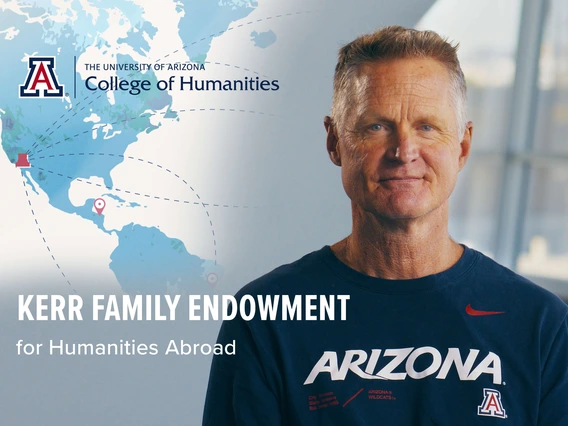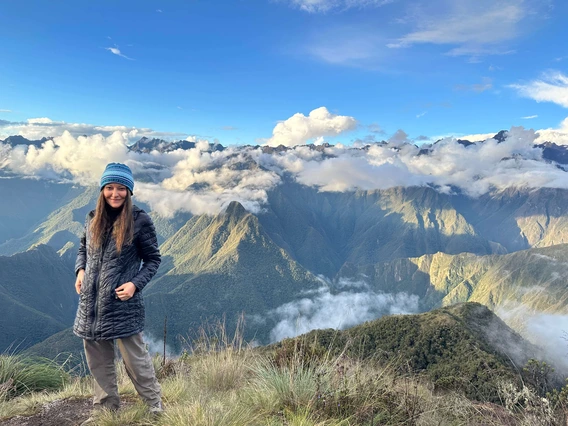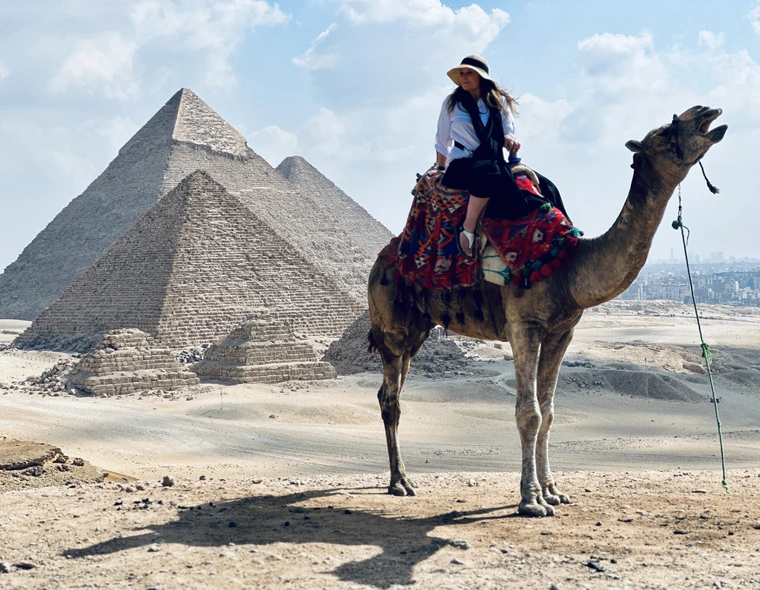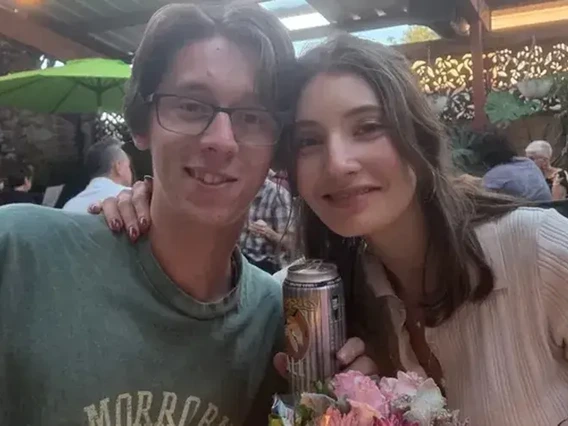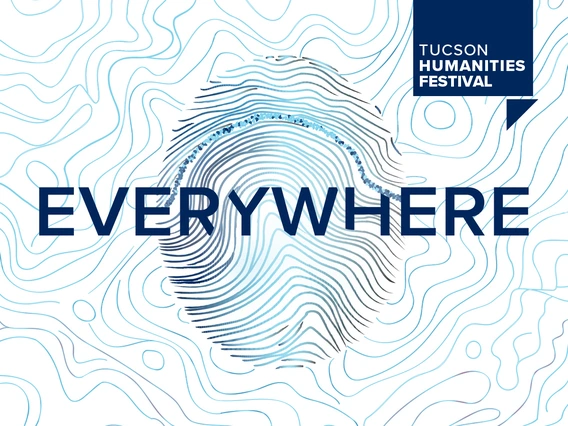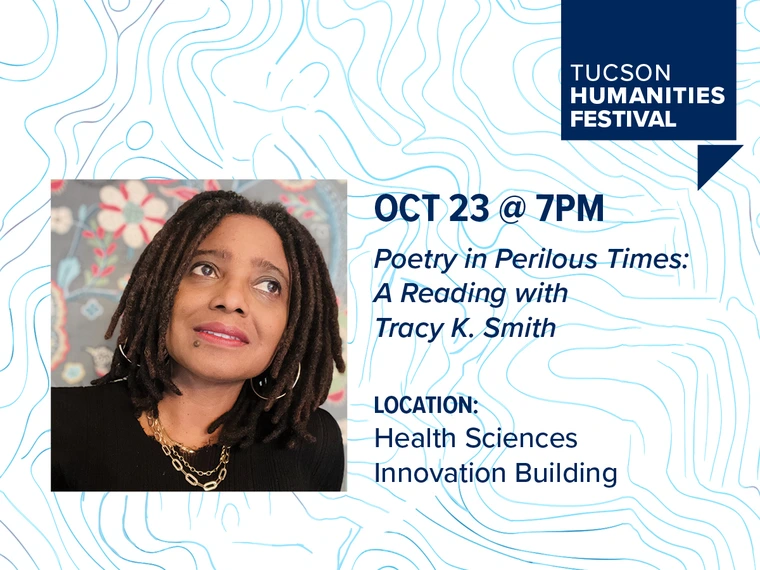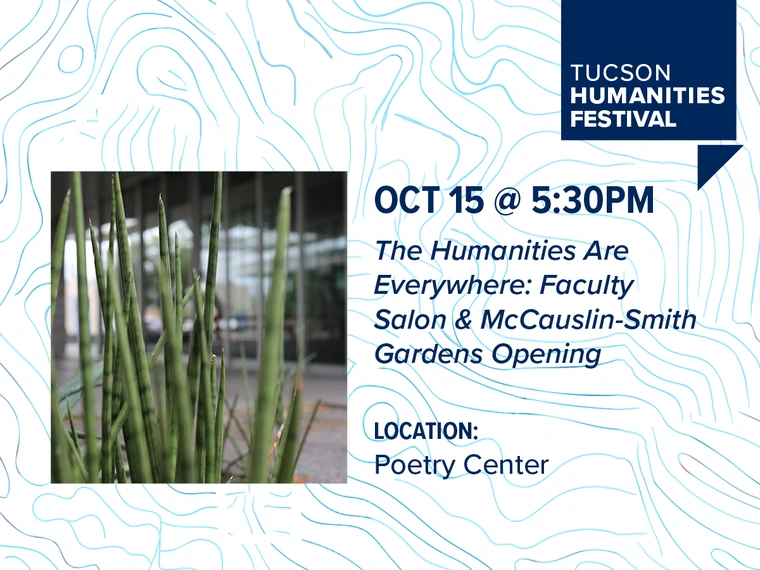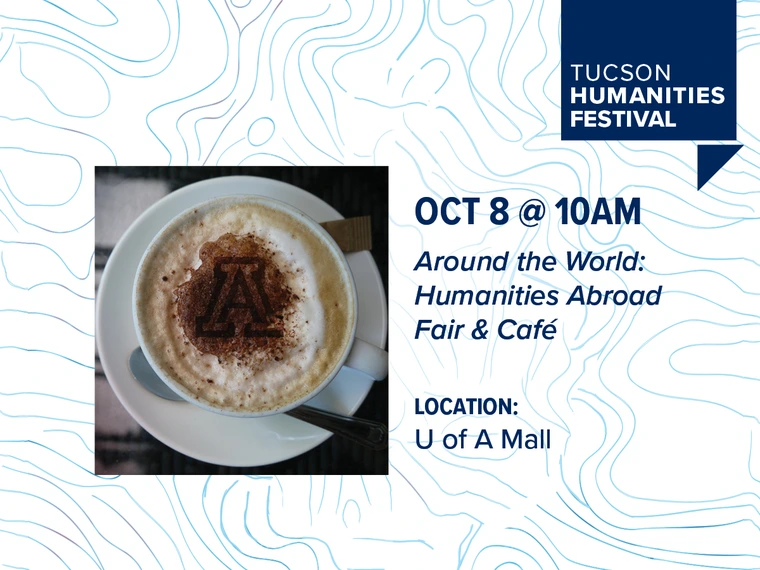Nov. 6, 2025
The last thing Melissa Fitch had ever imagined she would be doing on her sabbatical was fleeing an angry 300-pound Antarctic fur seal on the remote South Georgia island near Antarctica.
As a University Distinguished Professor of Latin American literature and cultural studies, how to respond in such a circumstance had never been part of her training. And yet, here she was, desperately trying to recall what she had learned just that morning: “Turn. Calmly face the aggressor. Hold your arms out in a V and finally, clap your hands and shout ‘No!’”
Antarctica was an unexpected detour for Fitch, who began her sabbatical year at the great pyramids of Cairo, Egypt before setting out on a multicontinental journey of pilgrimages. As the site of one of the bestselling novels ever written about a pilgrimage, Brazilian Paulo Coelho’s The Alchemist, Cairo was a fitting first step.
Inspired by her experience a year earlier completing the Camino de Santiago, which Coelho also wrote about, Fitch journeyed to Portugal to complete a different route of the Camino, then continued to the Inca Trail in Peru, shorter treks in Uruguay, Chile and Argentina, Japan’s Kumano Kodō and portions of Shackleton’s Endurance route in Antarctica.
The overall project for her sabbatical was to redesign a required course for majors and minors in the Department of Spanish and Portuguese around the idea of life as a journey or path, both literal and metaphoric, Fitch said. Researching along the way, via interviews with fellow travelers and those who live on the routes, reading about the pilgrimages themselves and collecting examples of journeys in literature, film, music and digital culture, Fitch worked on drawing the various threads together in a way to connect the themes for her students.
“The trope of life as a road, or a journey, is prevalent in cultural expressions throughout the world,” Fitch said. “It’s the perfect theme for building a course that can help students consider the surprisingly important topic of walking, one that has been used by everyone from storytellers to health professionals to convey spiritual enlightenment, physical and mental wellness, artistic inspiration, the traumas of war and economic strife and even the joy of play.”
The project title comes from a verse from Spaniard Antonio Machado’s most famous poem, “Proverbios y Cantares: XXIX,” written in 1912. “Caminante, no hay camino, se hace el camino al andar,” which means “Traveler, there is no road. The road is made upon walking.”
Fitch focused naturally on the Luso-Hispanic world, but her sabbatical camino pivoted to include an expedition to Antarctica that partly traced the route of explorer Ernest Shackleton’s famed Endurance voyage. She visited Shackleton’s grave on the island of South Georgia and researched the story of Luis Pardo, the Chilean captain who helped to rescue the 22 stranded crewmen of the Endurance.
Later, on the Falkland Islands, known as the Malvinas in Argentina, she spent time at the home of Mensun Bound, the maritime archaeologist who was a leader of the team that found the Endurance in 2022, nearly 107 years after the ship sank, and heard his story firsthand. Bound signed a copy of his book The Ship Beneath the Ice with a dedication to Fitch’s U of A students.
“Life takes unexpected detours. That in essence is the project itself,” Fitch said. “The destination is really not the objective. It’s about the journey itself and beginning to open your eyes up to the moment. You’ll face detours, obstacles, physical challenges, psychological challenges, moments of loneliness, but you just need to have faith and keep walking.”
Fitch recalled the end of her first morning on the Camino de Santiago, alone in the French Pyrenees, stuck in a steady rain and dense fog, anxious to cross the border into Spain. Rushing, she fell during a steep descent in the thick mud, ending up on her back like a turtle, with rain pouring on her face, then suddenly heard an American voice, asking if she needed help. It was the only person she’d seen the entire morning. The experience reminded her of the last line of Coelho’s novel The Pilgrimage, based on the author’s own experiences on the Camino de Santiago: “people will always arrive at the exact moment, at the exact place, where someone is waiting for them.” Reaching the cathedral of Santiago de Compostela after 33 days walking, she realized the metaphor of the camino was more multifaceted than she could ever have imagined. And she was ready for more.
“I slept in a castle from the 17th century. I slept in a gymnasium. I know people who’ve slept on a fire station floor. A lot of people will stay in monasteries. But you’re with other pilgrims from around the world and you share those experiences,” she said. “When you go on something as long as a month, you begin to see the same people. You’re in same small towns and you see people at their best and at their worst and this solidifies the bonding experience, along with the hours spent walking every day, speaking about life’s joys and tragedies, about personal and physical challenges. The longer the trek, the more profound the sense of connection was and the more one realizes how much we have in common with one another, irrespective of country of origin, language, culture or faith.”
Fitch will continue her treks in the Luso-Hispanic world after this semester, journeying to Colombia in December for a pilgrimage to Ciudad Perdida, the archaeological site of an ancient city that predates Machu Picchu by about 650 years. Then in January, she will explore the Afro-Brazilian pilgrimages written about by novelist Jorge Amado in Brazil.
After the spring semester, Fitch will return to Japan to trek the 1,200-kilometer (750-mile) Shikoku pilgrimage to 88 Buddhist temples, which will take about seven weeks to complete. The next phase will take her back to India and China, where she lived, lectured extensively and researched as a Fulbright Scholar in 2011-12 and 2016-17, to walk pilgrimage routes in both countries. Ideally she’d like to expand the project to Africa as well, where heritage pilgrimages to Ghana, Senegal and Benin by Black Americans have become increasingly common.
“You can look at this topic through so many different lenses. The goal is to share with students the stories of these caminos and the people who undertake them, and why, and what they learn about themselves and about the world,” she said. “At the U of A, we inspire our students to travel beyond the United States and recognize our common humanity. This is why the metaphor of the journey is so relevant and universal.”
To adapt her project to various courses Fitch teaches in literature and cultural studies of the Spanish and Portuguese-speaking world, she guides her students in exploring the theme through four geo-cultural modules: the Iberian Peninsula, Latin America, the U.S./Mexico Borderlands and the students’ own lives. Fitch provides her students with examples of the paths taken by their predecessors who graduated from U of A, some of whom she met with during her sabbatical.
“The course crosses multiple borders – age, race, ethnicity, social class, religion and ability – to expose our students to the rich cultural heritage of the Spanish and Portuguese speaking world through an examination of the arts and literature that treat the theme of life as a journey, or road,” Fitch said. “The topic ends, for the class, here in the borderlands. This is the story of many of us, too, as Americans in the U.S.-Mexico border region, and it fits in with other stories of migration from around the world. We need to be proud of our own history.”
Beyond undergraduate and graduate students, Fitch is teaching this fall in the Humanities Seminars Program, with a course titled “The Road is Made Upon Walking: Travels in the Luso-Hispanic World.”


